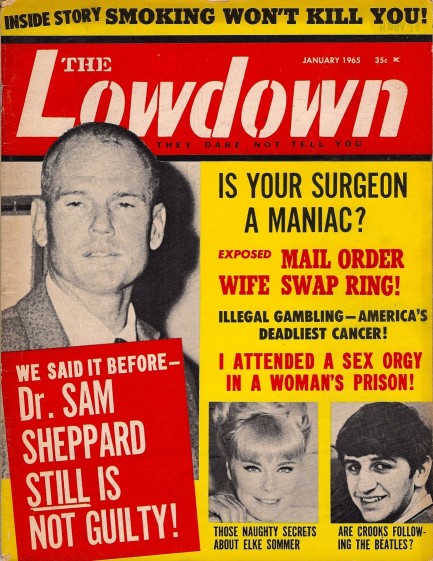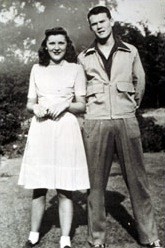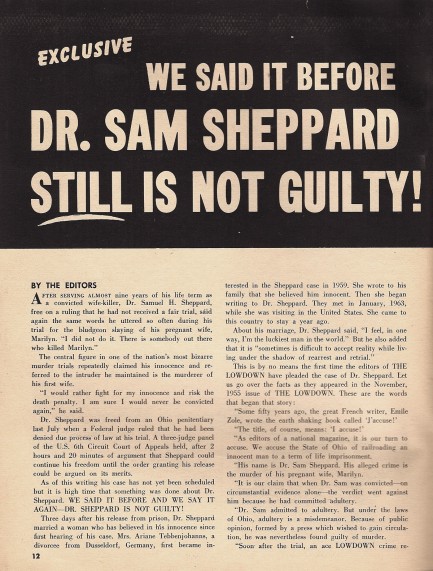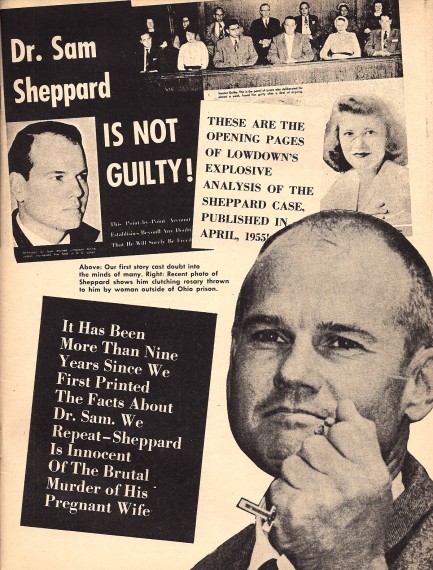 1954 murder results in fifty-year legal battle. 
In this January 1965 issue of The Lowdown, editors take up the cudgel for convicted murderer Dr. Sam Sheppard, who was serving a life sentence for the bludgeoning murder of his wife, Marilyn. Dr. Sheppard claimed that, during the early morning hours of July 4, 1954, he was in his home sleeping on a downstairs daybed, when he awoke to his wife’s screams. He ran to her aid and was attacked by a “bushy-haired man” and knocked out. When he came to he chased the man outside, fought him again, and was again knocked out. When he awoke once more, the intruder was gone and his wife was dead, having been severely beaten and apparently sexually assaulted. Police searched for the bushy-haired suspect, but eventually decided their perp was the good doctor himself. At a trial later that year a jury agreed, and Sheppard was sent up for life. By the time Lowdown began advocating for Sheppard, he had already been granted a writ of habeas corpas, and was about to be granted a new trial due to massive publicity surrounding the first that may have tainted the original jury pool. When Sheppard was retried the next year—with none other than a young F. Lee Bailey acting as his defense lawyer—he was acquitted on the basis of reasonable doubt. However, the verdict did not clear Sheppard’s name to the satisfaction of some family members. Efforts to do that continued all the way until 2002, complete with DNA testing on the exhumed corpses of Sheppard, his wife, and her unborn fetus. Results: inconclusive.  So you must be wondering why police focused on Sheppard in the first place. It wasn’t just because he was the husband, and his marriage was unhappy. Police investigators are very much like statisticians. Certain types of cases share certain traits, and the more traits a particular case shares with a certain category of cases, the more probable a certain conclusion begins to seem. An example: a home invader will nearly always immobilize the gravest threat first, meaning the man of the house; but in a staged domestic murder the man nearly always, somehow, is overlooked by the intruder, leading to a heroic rescue attempt that fails and results in injuries that are, somehow, never life-threatening. Another example: in a staged domestic murder the man will often remove clothing from the victim to imply that the motive was sexual assault by an intruder; but the rape is never consummated, for obvious reasons. So you must be wondering why police focused on Sheppard in the first place. It wasn’t just because he was the husband, and his marriage was unhappy. Police investigators are very much like statisticians. Certain types of cases share certain traits, and the more traits a particular case shares with a certain category of cases, the more probable a certain conclusion begins to seem. An example: a home invader will nearly always immobilize the gravest threat first, meaning the man of the house; but in a staged domestic murder the man nearly always, somehow, is overlooked by the intruder, leading to a heroic rescue attempt that fails and results in injuries that are, somehow, never life-threatening. Another example: in a staged domestic murder the man will often remove clothing from the victim to imply that the motive was sexual assault by an intruder; but the rape is never consummated, for obvious reasons. The list goes on. Suffice it to say, to the cops Marilyn Sheppard's killing seemed like a textbook staged domestic homicide, and they proceeded based on that assumption. But regardless, the evidence was never there for a conviction. Of that, there’s little dispute. Today, Sheppard’s innocence or guilt remains a hot topic in the Ohio town where he lived. And it probably always will be, if only because people there are reminded of the case every time The Fugitive appears on television. That’s right—if certain details of the story seem familiar, it’s because both the series and movie took inspiration from the Sheppard case. And there was one more important result. It catapulted F. Lee Bailey to national prominence as an attorney, a position he has held ever since in defending everyone from Patty Hearst to O.J. Simpson.
|
 |

The headlines that mattered yesteryear.
2003—Hope Dies
Film legend Bob Hope dies of pneumonia two months after celebrating his 100th birthday. 1945—Churchill Given the Sack
In spite of admiring Winston Churchill as a great wartime leader, Britons elect
Clement Attlee the nation's new prime minister in a sweeping victory for the Labour Party over the Conservatives. 1952—Evita Peron Dies
Eva Duarte de Peron, aka Evita, wife of the president of the Argentine Republic, dies from cancer at age 33. Evita had brought the working classes into a position of political power never witnessed before, but was hated by the nation's powerful military class. She is lain to rest in Milan, Italy in a secret grave under a nun's name, but is eventually returned to Argentina for reburial beside her husband in 1974. 1943—Mussolini Calls It Quits
Italian dictator Benito Mussolini steps down as head of the armed forces and the government. It soon becomes clear that Il Duce did not relinquish power voluntarily, but was forced to resign after former Fascist colleagues turned against him. He is later installed by Germany as leader of the Italian Social Republic in the north of the country, but is killed by partisans in 1945.
|

|
|

It's easy. We have an uploader that makes it a snap. Use it to submit your art, text, header, and subhead. Your post can be funny, serious, or anything in between, as long as it's vintage pulp. You'll get a byline and experience the fleeting pride of free authorship. We'll edit your post for typos, but the rest is up to you. Click here to give us your best shot.

|
|


 So you must be wondering why police focused on Sheppard in the first place. It wasn’t just because he was the husband, and his marriage was unhappy. Police investigators are very much like statisticians. Certain types of cases share certain traits, and the more traits a particular case shares with a certain category of cases, the more probable a certain conclusion begins to seem. An example: a home invader will nearly always immobilize the gravest threat first, meaning the man of the house; but in a staged domestic murder the man nearly always, somehow, is overlooked by the intruder, leading to a heroic rescue attempt that fails and results in injuries that are, somehow, never life-threatening. Another example: in a staged domestic murder the man will often remove clothing from the victim to imply that the motive was sexual assault by an intruder; but the rape is never consummated, for obvious reasons.
So you must be wondering why police focused on Sheppard in the first place. It wasn’t just because he was the husband, and his marriage was unhappy. Police investigators are very much like statisticians. Certain types of cases share certain traits, and the more traits a particular case shares with a certain category of cases, the more probable a certain conclusion begins to seem. An example: a home invader will nearly always immobilize the gravest threat first, meaning the man of the house; but in a staged domestic murder the man nearly always, somehow, is overlooked by the intruder, leading to a heroic rescue attempt that fails and results in injuries that are, somehow, never life-threatening. Another example: in a staged domestic murder the man will often remove clothing from the victim to imply that the motive was sexual assault by an intruder; but the rape is never consummated, for obvious reasons.





































































